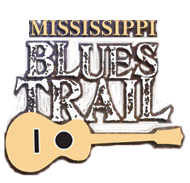Chrisman Street
Chrisman Street - Cleveland
During the segregation era many towns in Mississippi had a particular street that served as the center of African American business and social life, catering not only to townsfolk but to farm hands and sharecroppers from the countryside who came to shop and celebrate on weekends. Cleveland’s major black thoroughfare, South Chrisman Street, was lined with nightclubs, cafes, hotels, churches, stores, homes, and offices. Its most famous night spot was the Harlem Inn.
South Chrisman Street was once a hub of activity for residents of Bolivar County, which in the 1920 census was not only the most populous county in the state at 57,669 (82.4 percent black), but also the one with the most African American tenant farmers. As the cotton economy boomed, many African Americans moved to the Delta from Hinds County and other areas to work on local plantations, including the family of Charley Patton, who became the leading figure in early Mississippi blues. Patton and his partner Willie Brown were familiar figures in Cleveland and surrounding communities. Cleveland-born guitarist Ernest “Whiskey Red” Brown claimed that he, Patton, and Brown learned from a local guitarist named Earl Harris. Other early area musicians included Jake Martin, Jimmy and Otis Harris, Louie Black, Andrew Moore, and Patton’s most famous protégé, Howlin’ Wolf, who played in Cleveland both on the streets and in the Coconut Grove and Harlem Inn nightclubs. In his autobiography, The Father of the Blues, W. C. Handy wrote that he was enlightened to the value of the Delta’s “native music” in Cleveland when he witnessed a local trio being showered with coins (c. 1905). Later blues and R&B performers from Cleveland have included Monroe Jones, the Pearl Street Jumpers, Damon Davis, George Washington, Jr., Little Johnny Christian, Barkin’ Bill Smith, the East Side Jumpers, and Norman Burke, Jr.
Leslie and Virdie Hugger opened the Harlem Inn at 718 S. Chrisman in 1935 with no running water and only an outhouse in the back, but they eventually expanded it into a popular hotel, nightspot, pool hall, and eatery. Musicians, including traveling minstrel show bands, sometimes stayed at the hotel and played for their room and board. Muddy Waters, Sonny Boy Williamson No. 2, Ike Turner, Rufus Thomas, Memphis Slim, Joe and Jimmy Liggins, Fats Domino, B. B. King, Bobby Bland, and many others also played the club, according to Virdie Hugger. Other venues in the “Low End” section of town on Chrisman or at the intersection of Cross Street and Chrisman included the Hurricane Cafe, Swing Inn Club, Rock & Roll Center, Blue Note Café, Booker T. Theatre, Seals’ Café, Club 36, Club 66, Club Oasis, Happyland Café & Hotel, Roberta Robinson’s Café, and Eva’s Lounge. The Hurricane, operated in the 1950s by Cleveland residents Willie (Bill) and Inez Dixon, later moved to a site further south on Chrisman and as of 2009 was still in business as the Club Hurricane 2001 under the ownership of J. W. Foster. Civil rights leader Amzie Moore, who lived at 614 S. Chrisman, owned Moore’s Lounge on Highway 61, and in later years blues acts appeared elsewhere in town at the Airport Grocery, The Senator’s Place, and Delta State University. Blind preacher and guitarist Leon Pinson also lived on Chrisman and often played for tips on the street.
content © Mississippi Blues Commission
[ BACK TO TOP ]

